课文 达芬奇
- 格式:ppt
- 大小:926.50 KB
- 文档页数:13
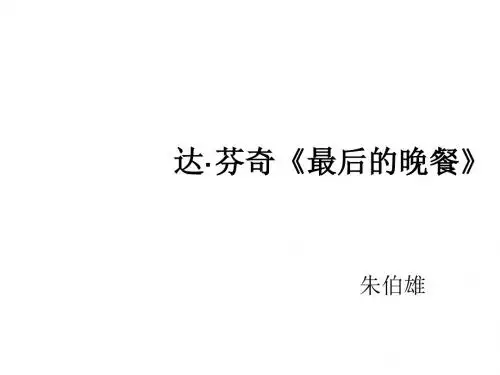
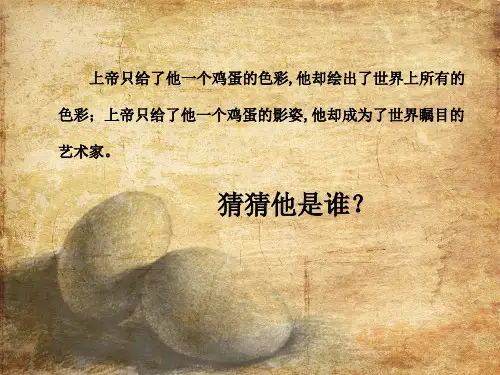
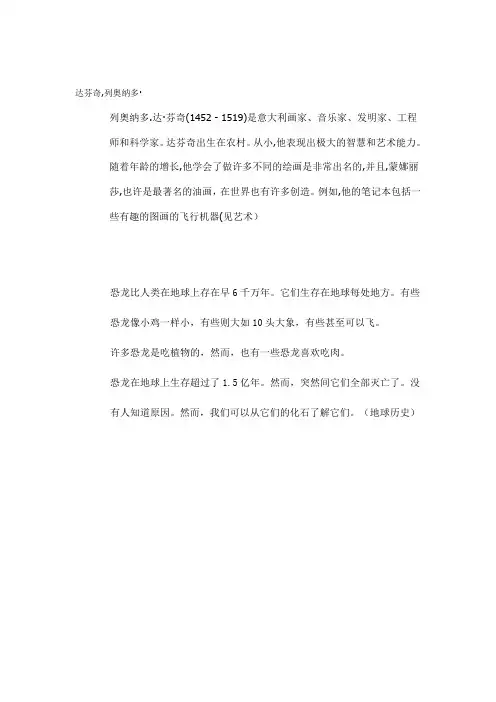
达芬奇,列奥纳多·
列奥纳多.达·芬奇(1452 - 1519)是意大利画家、音乐家、发明家、工程
师和科学家。
达芬奇出生在农村。
从小,他表现出极大的智慧和艺术能力。
随着年龄的增长,他学会了做许多不同的绘画是非常出名的,并且,蒙娜丽
莎,也许是最著名的油画,在世界也有许多创造。
例如,他的笔记本包括一
些有趣的图画的飞行机器(见艺术)
恐龙比人类在地球上存在早6千万年。
它们生存在地球每处地方。
有些
恐龙像小鸡一样小,有些则大如10头大象,有些甚至可以飞。
许多恐龙是吃植物的,然而,也有一些恐龙喜欢吃肉。
恐龙在地球上生存超过了1.5亿年。
然而,突然间它们全部灭亡了。
没
有人知道原因。
然而,我们可以从它们的化石了解它们。
(地球历史)。
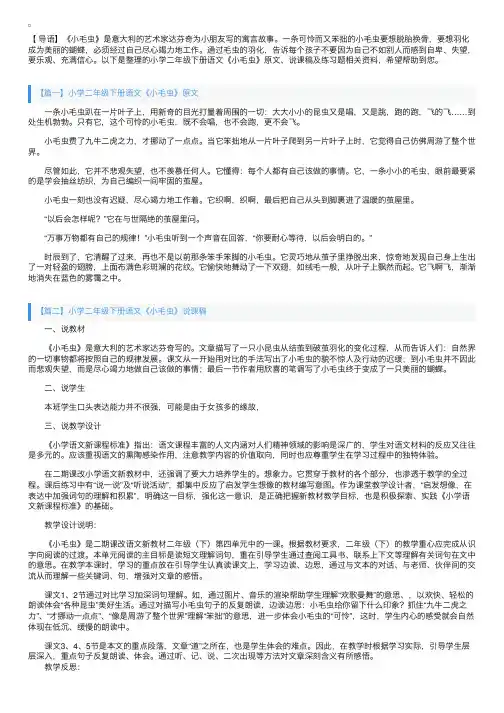
【导语】《⼩⽑⾍》是意⼤利的艺术家达芬奇为⼩朋友写的寓⾔故事。
⼀条可怜⽽⼜笨拙的⼩⽑⾍要想脱胎换⾻,要想⽻化成为美丽的蝴蝶,必须经过⾃⼰尽⼼竭⼒地⼯作。
通过⽑⾍的⽻化,告诉每个孩⼦不要因为⾃⼰不如别⼈⽽感到⾃卑、失望,要乐观、充满信⼼。
以下是整理的⼩学⼆年级下册语⽂《⼩⽑⾍》原⽂、说课稿及练习题相关资料,希望帮助到您。
【篇⼀】⼩学⼆年级下册语⽂《⼩⽑⾍》原⽂ ⼀条⼩⽑⾍趴在⼀⽚叶⼦上,⽤新奇的⽬光打量着周围的⼀切:⼤⼤⼩⼩的昆⾍⼜是唱,⼜是跳,跑的跑,飞的飞……到处⽣机勃勃。
只有它,这个可怜的⼩⽑⾍,既不会唱,也不会跑,更不会飞。
⼩⽑⾍费了九⽜⼆虎之⼒,才挪动了⼀点点。
当它笨拙地从⼀⽚叶⼦爬到另⼀⽚叶⼦上时,它觉得⾃⼰仿佛周游了整个世界。
尽管如此,它并不悲观失望,也不羡慕任何⼈。
它懂得:每个⼈都有⾃⼰该做的事情。
它,⼀条⼩⼩的⽑⾍,眼前最要紧的是学会抽丝纺织,为⾃⼰编织⼀间牢固的茧屋。
⼩⽑⾍⼀刻也没有迟疑,尽⼼竭⼒地⼯作着。
它织啊,织啊,最后把⾃⼰从头到脚裹进了温暖的茧屋⾥。
“以后会怎样呢?”它在与世隔绝的茧屋⾥问。
“万事万物都有⾃⼰的规律!”⼩⽑⾍听到⼀个声⾳在回答,“你要耐⼼等待,以后会明⽩的。
” 时⾠到了,它清醒了过来,再也不是以前那条笨⼿笨脚的⼩⽑⾍。
它灵巧地从茧⼦⾥挣脱出来,惊奇地发现⾃⼰⾝上⽣出了⼀对轻盈的翅膀,上⾯布满⾊彩斑斓的花纹。
它愉快地舞动了⼀下双翅,如绒⽑⼀般,从叶⼦上飘然⽽起。
它飞啊飞,渐渐地消失在蓝⾊的雾霭之中。
【篇⼆】⼩学⼆年级下册语⽂《⼩⽑⾍》说课稿 ⼀、说教材 《⼩⽑⾍》是意⼤利的艺术家达芬奇写的。
⽂章描写了⼀只⼩昆⾍从结茧到破茧⽻化的变化过程,从⽽告诉⼈们:⾃然界的⼀切事物都将按照⾃⼰的规律发展。
课⽂从⼀开始⽤对⽐的⼿法写出了⼩⽑⾍的貌不惊⼈及⾏动的迟缓;到⼩⽑⾍并不因此⽽悲观失望,⽽是尽⼼竭⼒地做⾃⼰该做的事情;最后⼀节作者⽤欣喜的笔调写了⼩⽑⾍终于变成了⼀只美丽的蝴蝶。
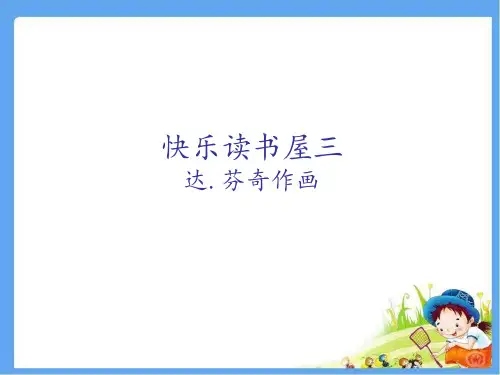
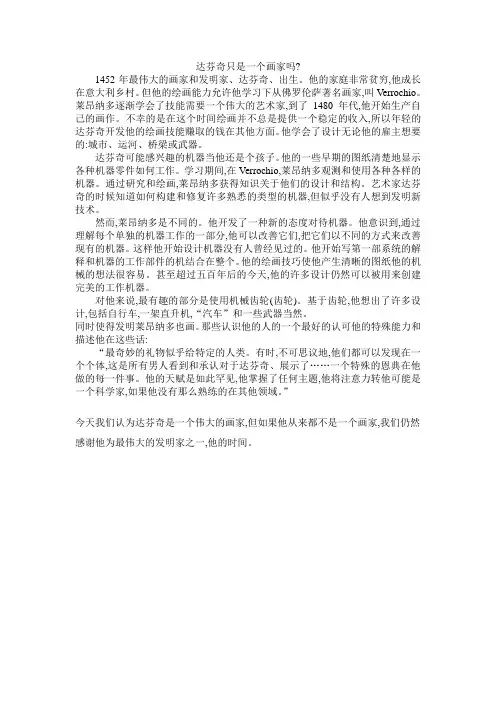
达芬奇只是一个画家吗?1452年最伟大的画家和发明家、达芬奇、出生。
他的家庭非常贫穷,他成长在意大利乡村。
但他的绘画能力允许他学习下从佛罗伦萨著名画家,叫Verrochio。
莱昂纳多逐渐学会了技能需要一个伟大的艺术家,到了1480年代,他开始生产自己的画作。
不幸的是在这个时间绘画并不总是提供一个稳定的收入,所以年轻的达芬奇开发他的绘画技能赚取的钱在其他方面。
他学会了设计无论他的雇主想要的:城市、运河、桥梁或武器。
达芬奇可能感兴趣的机器当他还是个孩子。
他的一些早期的图纸清楚地显示各种机器零件如何工作。
学习期间,在Verrochio,莱昂纳多观测和使用各种各样的机器。
通过研究和绘画,莱昂纳多获得知识关于他们的设计和结构。
艺术家达芬奇的时候知道如何构建和修复许多熟悉的类型的机器,但似乎没有人想到发明新技术。
然而,莱昂纳多是不同的。
他开发了一种新的态度对待机器。
他意识到,通过理解每个单独的机器工作的一部分,他可以改善它们,把它们以不同的方式来改善现有的机器。
这样他开始设计机器没有人曾经见过的。
他开始写第一部系统的解释和机器的工作部件的机结合在整个。
他的绘画技巧使他产生清晰的图纸他的机械的想法很容易。
甚至超过五百年后的今天,他的许多设计仍然可以被用来创建完美的工作机器。
对他来说,最有趣的部分是使用机械齿轮(齿轮)。
基于齿轮,他想出了许多设计,包括自行车,一架直升机,“汽车”和一些武器当然。
同时使得发明莱昂纳多也画。
那些认识他的人的一个最好的认可他的特殊能力和描述他在这些话:“最奇妙的礼物似乎给特定的人类。
有时,不可思议地,他们都可以发现在一个个体,这是所有男人看到和承认对于达芬奇、展示了……一个特殊的恩典在他做的每一件事。
他的天赋是如此罕见,他掌握了任何主题,他将注意力转他可能是一个科学家,如果他没有那么熟练的在其他领域。
”今天我们认为达芬奇是一个伟大的画家,但如果他从来都不是一个画家,我们仍然感谢他为最伟大的发明家之一,他的时间。
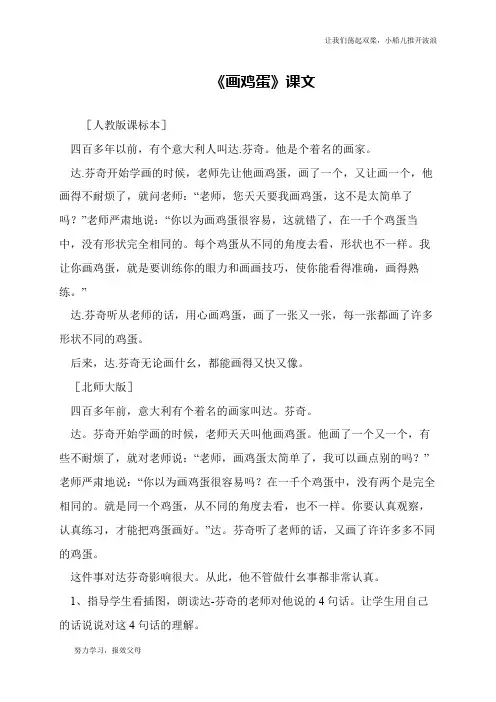
让我们荡起双桨,小船儿推开波浪
努力学习,报效父母《画鸡蛋》课文
[人教版课标本]
四百多年以前,有个意大利人叫达.芬奇。
他是个着名的画家。
达.芬奇开始学画的时候,老师先让他画鸡蛋,画了一个,又让画一个,他画得不耐烦了,就问老师:“老师,您天天要我画鸡蛋,这不是太简单了吗?”老师严肃地说:“你以为画鸡蛋很容易,这就错了,在一千个鸡蛋当中,没有形状完全相同的。
每个鸡蛋从不同的角度去看,形状也不一样。
我让你画鸡蛋,就是要训练你的眼力和画画技巧,使你能看得准确,画得熟练。
”
达.芬奇听从老师的话,用心画鸡蛋,画了一张又一张,每一张都画了许多形状不同的鸡蛋。
后来,达.芬奇无论画什幺,都能画得又快又像。
[北师大版]
四百多年前,意大利有个着名的画家叫达。
芬奇。
达。
芬奇开始学画的时候,老师天天叫他画鸡蛋。
他画了一个又一个,有些不耐烦了,就对老师说:“老师,画鸡蛋太简单了,我可以画点别的吗?”老师严肃地说:“你以为画鸡蛋很容易吗?在一千个鸡蛋中,没有两个是完全相同的。
就是同一个鸡蛋,从不同的角度去看,也不一样。
你要认真观察,认真练习,才能把鸡蛋画好。
”达。
芬奇听了老师的话,又画了许许多多不同的鸡蛋。
这件事对达芬奇影响很大。
从此,他不管做什幺事都非常认真。
1、指导学生看插图,朗读达-芬奇的老师对他说的4句话。
让学生用自己的话说说对这4句话的理解。

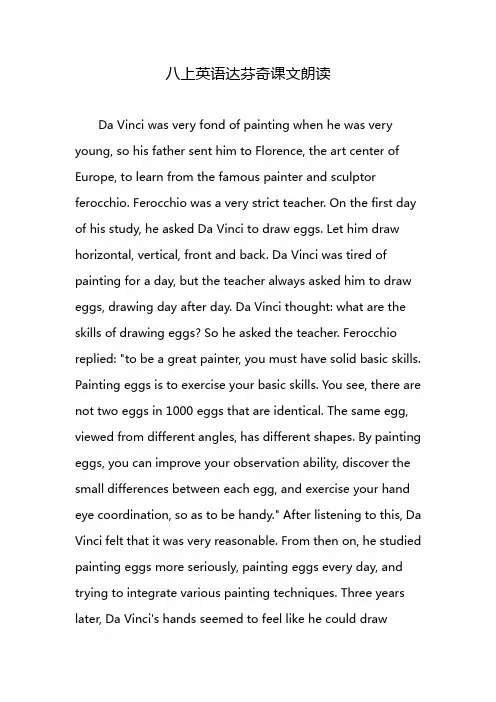
八上英语达芬奇课文朗读Da Vinci was very fond of painting when he was very young, so his father sent him to Florence, the art center of Europe, to learn from the famous painter and sculptor ferocchio. Ferocchio was a very strict teacher. On the first day of his study, he asked Da Vinci to draw eggs. Let him draw horizontal, vertical, front and back. Da Vinci was tired of painting for a day, but the teacher always asked him to draw eggs, drawing day after day. Da Vinci thought: what are the skills of drawing eggs? So he asked the teacher. Ferocchio replied: "to be a great painter, you must have solid basic skills. Painting eggs is to exercise your basic skills. You see, there are not two eggs in 1000 eggs that are identical. The same egg, viewed from different angles, has different shapes. By painting eggs, you can improve your observation ability, discover the small differences between each egg, and exercise your hand eye coordination, so as to be handy." After listening to this, Da Vinci felt that it was very reasonable. From then on, he studied painting eggs more seriously, painting eggs every day, and trying to integrate various painting techniques. Three years later, Da Vinci's hands seemed to feel like he could drawanything he wanted; What I draw is like what I draw.达芬奇在很小的时候就非常喜欢画画,于是父亲就把他送到欧洲的艺术中心佛罗伦萨,拜著名的画家和雕塑家费罗基俄为师。
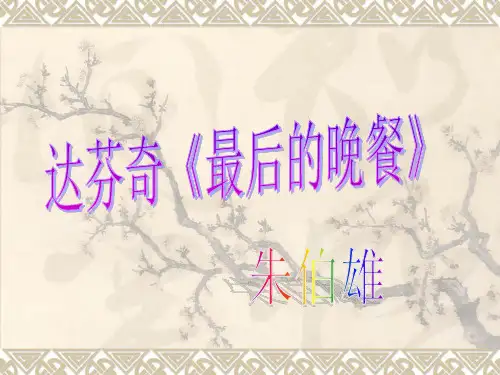
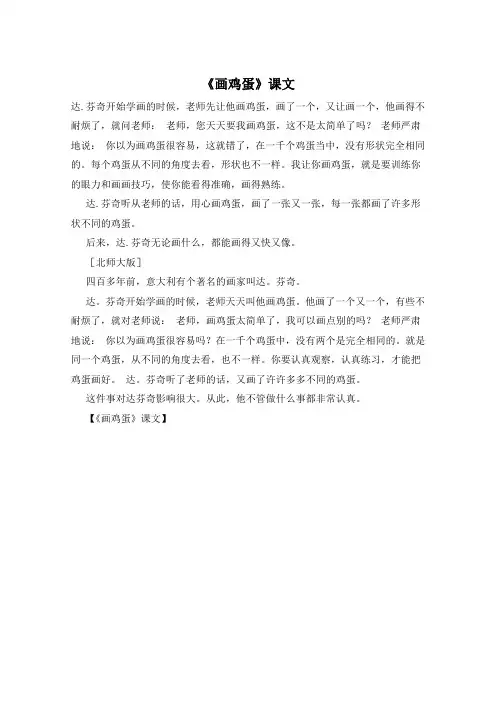
《画鸡蛋》课文
达.芬奇开始学画的时候,老师先让他画鸡蛋,画了一个,又让画一个,他画得不耐烦了,就问老师:老师,您天天要我画鸡蛋,这不是太简单了吗?老师严肃地说:你以为画鸡蛋很容易,这就错了,在一千个鸡蛋当中,没有形状完全相同的。
每个鸡蛋从不同的角度去看,形状也不一样。
我让你画鸡蛋,就是要训练你的眼力和画画技巧,使你能看得准确,画得熟练。
达.芬奇听从老师的话,用心画鸡蛋,画了一张又一张,每一张都画了许多形状不同的鸡蛋。
后来,达.芬奇无论画什么,都能画得又快又像。
[北师大版]
四百多年前,意大利有个著名的画家叫达。
芬奇。
达。
芬奇开始学画的时候,老师天天叫他画鸡蛋。
他画了一个又一个,有些不耐烦了,就对老师说:老师,画鸡蛋太简单了,我可以画点别的吗?老师严肃地说:你以为画鸡蛋很容易吗?在一千个鸡蛋中,没有两个是完全相同的。
就是同一个鸡蛋,从不同的角度去看,也不一样。
你要认真观察,认真练习,才能把鸡蛋画好。
达。
芬奇听了老师的话,又画了许许多多不同的鸡蛋。
这件事对达芬奇影响很大。
从此,他不管做什么事都非常认真。
【《画鸡蛋》课文】。
da vinci's world课文挖空引言概述:《da vinci's world》是一篇关于达·芬奇世界的课文,通过挖空的方式来介绍达·芬奇的生平和他对艺术、科学的贡献。
本文将按照要求的结构,分五个大点来详细阐述达·芬奇的世界。
正文内容:1. 达·芬奇的生平1.1 早年经历:达·芬奇出生于意大利的一个小村庄,他从小就展现出对艺术的热爱和天赋。
1.2 艺术启蒙:达·芬奇在佛罗伦萨学习绘画,并受到了当时一些杰出艺术家的影响,如米开朗基罗等。
1.3 科学探索:达·芬奇对科学也有浓厚的兴趣,他进行了许多解剖学和工程学的研究,为后世做出了重要贡献。
2. 达·芬奇的艺术成就2.1 画作:达·芬奇的画作被誉为艺术的杰作,他的《蒙娜丽莎》、《最后的晚餐》等作品至今仍然被广泛欣赏和研究。
2.2 雕塑:除了绘画,达·芬奇还擅长雕塑,他的雕塑作品也展现了他对人体结构的深入研究。
2.3 装饰艺术:达·芬奇还在建筑和装饰艺术方面有很高的造诣,他的设计和创意对当时的建筑界有着深远的影响。
3. 达·芬奇的科学贡献3.1 解剖学:达·芬奇进行了大量的解剖学研究,他的详细解剖图对于后世的医学和生物学研究产生了重要影响。
3.2 工程学:达·芬奇对机械和工程学也有着浓厚的兴趣,他设计了许多创新的机械装置和工程结构。
3.3 天文学:达·芬奇对天文学也有一定的研究,他观察和记录了很多天体现象,并提出了一些关于宇宙的独特见解。
4. 达·芬奇的思想和哲学4.1 人文主义:达·芬奇是一位典型的文艺复兴时期的人文主义者,他对人类的关注和尊重贯穿于他的艺术和科学研究中。
4.2 自然观察:达·芬奇非常注重对自然的观察和描绘,他的作品中展现了对细节的敏锐观察和对自然之美的赞美。
Look it upHere are two articles from an encyclopediaDa Vinci, LeonardoLeonardo Da Vinci (1452-1519), was an Italian painter, inventor, musician, engineer and scientist.Da Vinci was born in the countryside. Form an early age, he showed great intelligence and artistic ability. As he grew older, he learned to do many different things. His paintings are very famous. And once, the Mona Lisa is perhaps the most famous painting in the world. He also had many inventions, for example, his notebooks include some interesting drawings of flying machines.DinosaursDinosaurs lived on Earth for more than 60million years before human beings. They lived everywhere on Earth. Some dinosaurs were as small as chickens; others were as big as ten elephants. Some could even fly.Many dinosaurs ate plants. However, some dinosaurs liked to eat meat.Dinosaurs lived on Earth for more than 150 million years. Then suddenly, they all died out. Nobody knows why. However, we can learn about them form their fossils.The king and the riceA long time ago, there was a king in India. The king favourite game was chess.One day, a wise old man came to palaces and the king challenged him to a game. The king promised the old man, “If you win the game, you can have any prize.”The old man said, “If I win the game, I’d like one grain of the rice for the first square of the chessboard, two for the second, four for the third, and then double the amount for each of the rest squares.”“Is that all?”asked the king “Wouldn’t you like gold or silver instead?”“No, just rice.” Replied the old man.The king and the old man played the game for a long time. Finally, the old man won. So the king ordered his men to collect a bag of rice. He put one grain of the rice on the first square, two on the second, and so on. The king quickly realized a problem. Even with all the rice in the country, he would still not have enough rice to put on all the square!Computer factsSmaller and BetterIn the 1940s, the first computers were bigger than cars. Now computers are becoming smaller and better.Some computers are tiny. You may be unaware of them. There is probably one inside your TV or washing machines. You depend on computers more than you realize.What can we do with computers?We can use computer to calculate. They can calculate at a faster speed than we can and almost never give wrong answers. We can also type and draw things with computer. In addition, computers can do important things like operating railways and flying planes and spaceship.Is a computer cleverer than me?The answer is “No”. Your brain can produce new idea but computers cannot. However, one day computers may be able to do a better job than human beings. For example, they may be better than doctor at doing their jobs.What will happen to us if computer can do all our jobs? Will we have nothing to do? Computers may chances our lives, but will they make them better?Great inventionsGreat inventions change the world. They help people live a better life. The following are there of the most important inventions in historyThe WheelThe wheel is perhaps the most important inventions in history. After its invention, travelling became faster and more comfortable. A few thousands years ago, people started to use wheel on carriages. In the 19th century, the first train started to carry passengers. At the start of the 20th century, cars became more and more popular. Without the wheel, we could not have these inventions.TelephoneAlexander Graham Bell invented one of the first practical telephones in 1876. Since then, People have been able to speak to each other over long distances. Today millions of people across the world own mobile phone. They allow people to keep in touch with each other anytime, anywhere.The light bulbThomas Edison developed the first practical light bulb in 1879. Before the inventions of the light bulb, people had to us oil lamps, gas lamps or candles to see at night. With light bulb,people can do as many things in the evenings as they can in the daytime.Can you imagine living without them?An exchange visiting is educational and interestingA group of British students from Woodpark School in London are visiting Xinhua Junior High School in Beijing on an educational exchange.“I was very nervous at first”, says Sarah. “However, my host family are really friendly. I am glad to be a guest in their home. I have learnt to use chopsticks. And they are teaching me a little Chinese.”The students spend the weekdays studying with Chinese students. At weekend, they tour around and visit some places of interest in Beijing with their host family.“It is been a fantastic experience so far,”says Eric. “I have learned a bit of t’ai chi and I really enjoy it. We have already learned a lot about the Chinese culture and history. The teachers have introduced us to Chinese painting as well. We have also tried to paint some pictures ourselves! I haven’t had much success yet, but I will keep trying.”“I have made many new friends,” says Sarah, “I am planning tokeep in touch with them when I return home. We will see one another because they will come over to the UK for the second part of the exchange next month. I can’t wait!”The Trojan horseThe captain stood on the high wall of the city of Troy. “The Greeks have gone and we have won,” he said. “They have tried to capture our city for ten years. Now they have given up and sailed away.”“But looked over there!” a solder said, “There have left a huge wooden horse!”“Ah, yes,”said the captain, “It is too big, The Greeks did not want to take it with them. Get some help and pull it into the city.”That night, in the main square of the city, all the Trojans celebrated. They sang and danced around the horse, and made jokes about the stupid Greeks. “I haven’t laughed like this since my childhood.” The captain said. After the party, they locked all the gates of the city and then all went to sleep.By midnight, the main square was empty, expect for a huge horse. Suddenly, a secret door opened on the side of the wooden horse. The horse was full of the Greek solders! The soldersquietly climbed out of the horse one by one.The solders opened the main gates. The Greek army entered. For ten years, the Greeks could not capture the city by fighting. In one night, however, they succeed in capturing it through a clever trick.Henry, Paula and Millie write for the school newspaper. They have written the short articles below to help students improve their memoryRosie Bridge School, 27 MarchMemory CornerHenryA great way to help you remember something is to imagine a picture of it in your mind. If you make the picture big, strange and silly, you will remember it better. For example, if you want to remember the world “smiles”, you can imagine there is a “mile” between the first letter and the last latter. This makes it the longest word in the world. Remember: a picture is worth a thousand words.PaulaA good method for remembering the spelling of a word is to make a short sentence with each letter of the word. For example,if you want to know how to spell the word “because”, you can make the sentence, “Big elephants can always understand small elephants.”MillieYou will forget thing very quickly unless you remember it well. For example, you may have trouble remembering the list of the steps in the water cycle.However, it is easier to remember these steps if you understand how the water cycle works.Rosie Bridge School, 18 MayEnglish: fun for lifeEnglish week at Rosie Bridge SchoolLast week, students at Rosie Bridge School worked hard to make their English Week a big success.There was an English book fair in the library and treasure hunt. Some students put on an English play. Other students took part in an English singing competition.There was also an English speaking competition. The students had to speak on a topic in English for two minutes.We spoke to the winner, Henry. “I am so happy that I won”, he said, “I advice people to spoke slowly. If they want to be goodpublic speakers, they had better speak clearly, slowly and confidently.”We also spoke to several other students about English Week. One of them was Amy.“I really enjoy in English Week. It gave me a chance to learn new words. In my opinion, every school should have an English Week. It is well worth doing.” she said.On the last day of the English Week, the head teacher gave a speech to whole school. He gave students some suggestions on how to improve their English. “You should communicate with your friends in English whenever you can. You should read some English books and magazines and watch English television programmes. Above all, you should enjoy English.”he said.。
八年级上册语文达芬奇达·芬奇于1452年生于一个小城,那个城市的名字就是他的姓——芬奇,他的父亲是城中的画吏。
达•芬奇在佛罗伦萨时,常到市集去购买整笼的鸟放生,他放生的情景是非常有趣的:他仔仔细细地观察鸟的飞翔的组织,这是他极感兴味的事情;他又鉴赏在日光中映耀着的羽毛的复杂的色彩;末了,他看到小鸟们振翼飞起重获自由的情景,心里感到无名的幸福。
达·芬奇是当时的先驱者,具有毫无利害观念的好奇心。
对于他来说,一切都值得加以研究。
他的心随时可以受到感动。
他在那部名著《绘画论》中写道:“你有没有在隐晦的黄昏,观察过男人和女人们的脸?在没有太阳的微光中,它们显得何等柔和!在这种时间,当你回到家里,趁你保有着印象的时候,赶快把它们描绘下来吧。
”达·芬奇相信美的目标、美的终极就在“美”本身,正如科学家对于一件学问的兴趣即在这学问一般。
到1483年达·芬奇三十一岁时,他一直住在佛罗伦萨,以后他到米兰大公府服务,直到1499年方才离去。
这十六年是达·芬奇一生创作最丰富的时代,即便如此,世上所有存留的达·芬奇的真迹仍不到十件,而且几乎完全是小幅的,有几幅还是未完之作。
画在米兰城圣玛丽大寺的壁画《最后的晚餐》,费了四年的光阴还没有完成,没有一个人物不是经过他长久而仔细地研究的。
达•芬奇是大艺术家,同时也是渊博的学者,却只完成了极少数的画。
由此,我们还可以得出一个超出绘画领域以外的重要结论:他对于他的由想象孕育成的境界有明白清楚的了解,这使他觉得老师无法实现,他的判断要永远超过作品。
同时,达·芬奇对于他的荣誉、尊严的顾虑十分深切,他毫不惋惜地毁坏一切他认为不完美的作品。
“你绝不要想在别件作品中再行改正而宽恕了自己。
绘画并不像音乐般会隐去。
你的画将永远在哪里证明你的愚昧。
”他的作品稀少还有一个原因是他只想发现一种定律而不大顾虑到实施,目标本身较之追求目标更引起他的兴味。
达·芬奇简介
达芬奇是意大利文艺复兴时期最伟大最著名的巨匠,他不仅是一位天才的画家,并且是大数学家,科学家,力学家和工程师,是一位多才多艺,全面发展的人。
他有着多方面的才能,对人类作出过多方面的贡献。
他不仅会画画,雕塑,建筑房屋,还会发明武器,设计过世界上第一个飞行机。
他又是一个医学家,音乐家和戏剧家,而且在物理学。
地理学和植物学等其它科学的研究上也很有成就。
他道德高尚,举止温雅,且体格健壮,力量过人,据说他一只手就能轻易地折断马蹄铁。
他左右手都会写字,作画,他用左手写的字是反向的,人们只有在镜子里才能看懂。
达芬奇出生于佛罗伦萨附近的芬奇镇,这是一个景色秀丽,风景如画的地方,展现出一派田园风光:山坡上有葡萄园,山谷里耸立着四季常绿的树木,潺潺的溪水和叽叽喳喳的鸟叫声构成了一曲欢快悦耳的音乐。
在这样美丽的自然环境的熏陶下,达芬奇的观察力和感受力都逐渐敏锐和丰富起来。